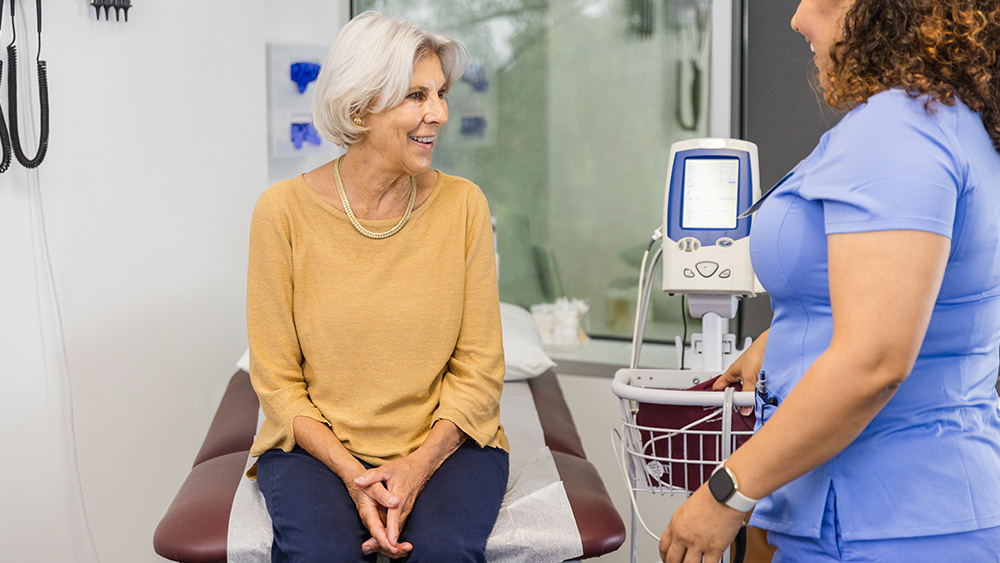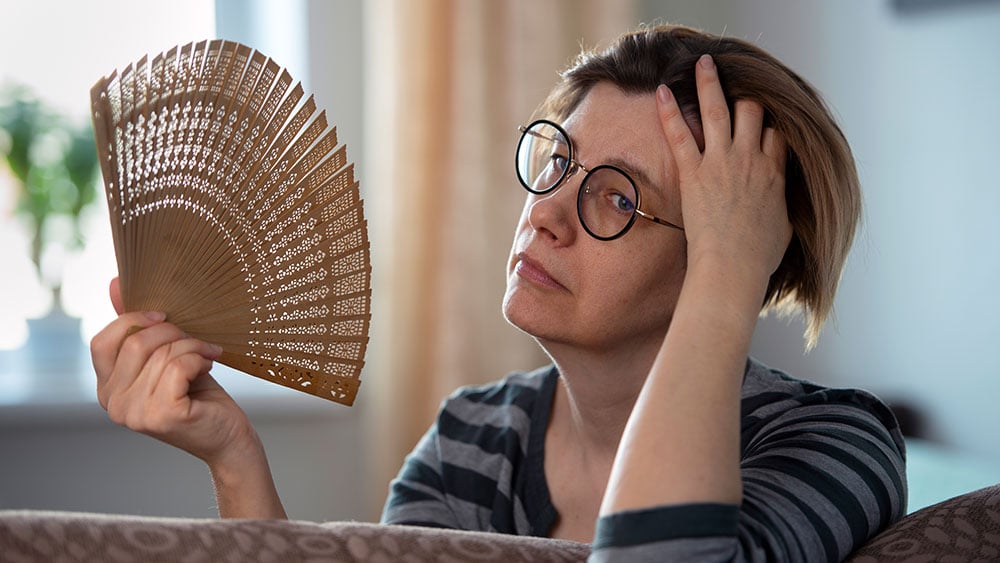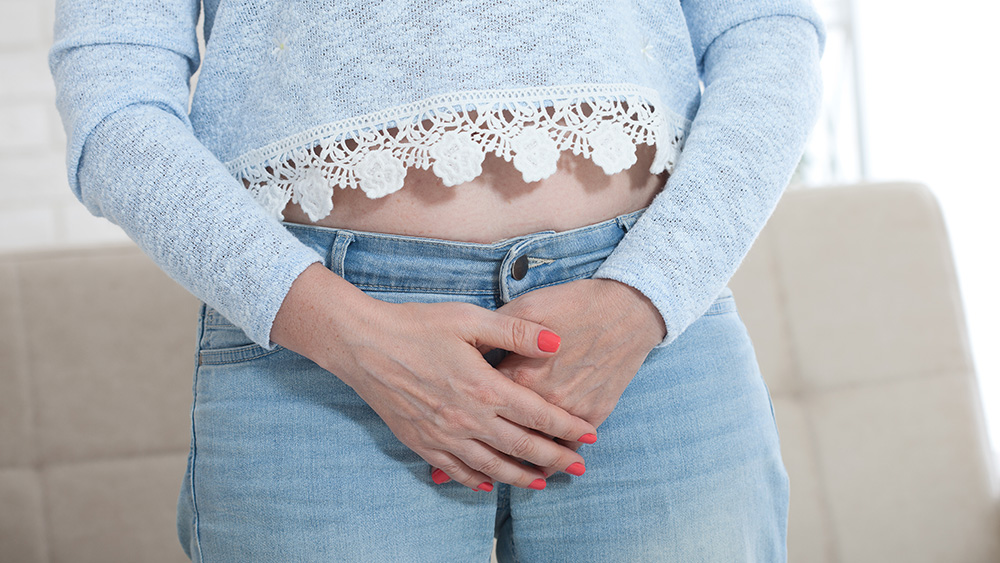Key Takeaways
- Common menopause symptoms are hot flashes, mood instability, vaginal dryness, incontinence, and pain with sex.
- Symptoms that you may not attribute to menopause may include digestive changes, inability to concentrate, joint pain, vaginal nerve pain, and weight gain.
- Talk with your OBGYN or primary care provider about finding solutions that bring you relief and less pain.
Menopause occurs after a woman goes 12 consecutive months without having a menstrual period. When ovaries stop producing eggs, they dramatically slow down production of hormones as well – mostly estrogen, progesterone, and testosterone. This typically happens between ages 45 and 55, with some exceptions.
During the time leading to that change (perimenopause), the body needs to adjust to those changing hormone levels and experiences a variety of symptoms.
While more women are starting to talk about menopause more and the public conversation around menopause is less stigmatized than in the past, there are some menopause symptoms that patients may be hesitant to talk about or ask about.
Regina Farrell, MD, is an OBGYN provider at the Women’s Health Center - Newark and sees many patients going through perimenopause and menopause. She shares some of the menopause changes that are not talked about as frequently, and how to find relief.
Common symptoms of menopause
Many patients expect to go through at least one common symptom of menopause while the hormones change in their body.
These symptoms include:
- Hot flashes
- Night sweats
- Incontinence
- Emotional irritability
- Vaginal dryness
- Mood instability
While these changes are often expected, there are others that are in more of a gray area. It can be hard for women to tell if something might be part of menopause or if it is unrelated.
“Some patients are really frustrated by the time they get to you,” Dr. Farrell said. “They have been going through changes and by the time they get to a provider, they are really looking for help.”
Lesser-known symptoms of menopause
Weight gain
Estrogen plays a role in many functions of the body, including where fat is stored in the body.
While the female body is producing more estrogen, the hormone stores fat in the breasts and hips. Once estrogen production slows down during menopause, that storage shifts to place fat around your organs. As a result, the body shape changes drastically.
“It is very common when your body has lost estrogen to have the visceral fat, especially around the belly, and see that shape change that people go through over those two years,” Dr. Farrell said.
How to help: Dr. Farrell suggests working on building muscle early. Every year after age 30, women lose about 5 percent of their muscle mass. The amount of muscle you have affects your baseline metabolism, and how much food you can eat on a daily basis. More muscle in your body means less fat.
Data also shows women who build muscle mass have healthy blood sugar levels, sleep better, and have better functional movement.
Digestive changes
Another area estrogen affects your body is insulin sensitivity. Estrogen helps insulin move glucose into the bloodstream. Once estrogen production goes down, this leaves more sugar in your gut, which affects the healthy bacteria in your gut.
Those gut changes can impact bowel movement, bloating, and inflammation in your digestive tract – even potentially contributing to irritable bowel syndrome (IBS).
How to help: Exercising and moving your body will help reduce inflammation. Adding in yoga or some form of resistance training can help with digestion, as well.
Work on maintaining a diet like the Mediterranean diet that avoids ultra-processed foods, sugar, and red meat, and focuses more on lots of vegetables and fruits, fish 2-3 times a week, and lean or plant proteins like beans and nuts.
Inability to concentrate
This feeling is different from person to person. Sometimes patients describe the sensation of suddenly being unable to concentrate on one specific thing for long, or like they are not in control of the words in their brain. It is also often described as brain fog.
Research suggests a specific area of the brain linked to memory, attention, and language skills is rich in estrogen receptors. As estrogen production drops, those skills can be affected.
Some studies show perimenopausal patients score a bit lower on cognition testing during their transition years; however their scores did improve over time. It is important to stress that not everyone experiences cognitive changes the same way.
“It is a relatively small amount of time when this transition is happening, but it can still be really hard and frustrating for people,” Dr. Farrell said. “It can be helpful to know there's a real reason for that based on where the estrogen receptors are in your brain.”
How to help: Your brain can be trained to improve its performance, similar to how you train a muscle. Getting adequate sleep to help your brain rebuild itself so it can rest. If your sleep quality is changed or affected, that is noticeable.
Being intentional about focusing can sound like a cliché. But for some tasks where you didn’t necessarily need to focus pre-menopause, that intentional direction of your full attention on the task at hand may help. Spending time doing some problem solving through things such as word puzzles or Sudoku can also be good for your brain and emotional health.
Joint pain
Addressing joint pain during menopause is complicated because there are several different factors that can influence this type of pain at this stage of life.
Bone loss during menopause can contribute to joint pain, but inflammation and estrogen levels also have some effect on it. There is a lot of ongoing study in this area of menopause – and a variety of solutions that can give women relief.
How to help: Both lifestyle changes and various types of supplements and medicines can help with joint pain.
Strength training in the years before menopause can build strong muscles and bones, which will offset the burden on joints. Exercise and movement keep joints consistently in motion, which keeps them healthy.
Taking magnesium, calcium, and vitamin D has been shown to boost bone health and reduce joint pain for some women. Talk with your doctor about the correct dosage; taking the wrong amount may be harmful. Epsom salts or essential oils may reduce joint pain in some women, as well.
Physical therapy and acupuncture can both provide relief, as well.
Vaginal nerve pain
When patients talk about changes in vaginal nerve sensitivity or pain, it often can be related to estrogen receptors in the nerves. Losing estrogen that affects nerves in vaginal tissue leads to a loss of flexibility that is also linked to reduced collagen and elastin. For those reasons, the vaginal tissue won’t have the ability to stretch as well as it did pre-menopause.
How to help: Dr. Farrell encourages her patients to pay attention to the products they are using for natural fibers, no dyes, and even some essential oils.
Using an over-the-counter cream for lubrication or moisture daily can provide protection from bacterial infection and other concerns. Topical estrogen can offer relief, as well.
Similar to adolescence, menopause is a time of life when your body is going through a lot of changes – some of which may be unexpected.
“Patients should take in all the information they can with the understanding that they are the expert in their body and whatever is going to help their quality of life is what works best,” Dr. Farrell said. “Providers are here to be partners in care.”










